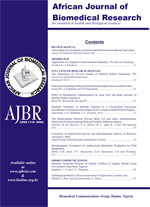
|
African Journal of Biomedical Research
Ibadan Biomedical Communications Group
ISSN: 1119-5096
Vol. 10, No. 2, 2007, pp. 145-151
|
 Bioline Code: md07020
Bioline Code: md07020
Full paper language: English
Document type: Research Article
Document available free of charge
|
|
|
African Journal of Biomedical Research, Vol. 10, No. 2, 2007, pp. 145-151
| en |
Acid secretory response and electrolyte composition of gastric juice in Diabetic rats
Adewoye, Elsie O.; Olaleye, Samuel B. & Ige, Abayomi O.
Abstract
This study was designed to investigate gastric acid secretion and electrolyte composition in diabetic rats. 60 male rats of Wister strain weighing between 200 – 260g were used for the study. Diabetes was induced with 65mg/kgbw alloxan intravenously and confirmed with a constant blood glucose level ≥200mg/dl. Acid secretion was measured using the continuous perfusion method. Gastric juice was collected through a duodenal cannular attached to the pyloric ligation and its electrolyte composition was determined. Basal acid secretion was collected in aliquots every 10minutes for a period of 50minutes Histamine (10mg/kgbw) was injected intramuscularly into the histamine group and carbachol (20µg/kgbw) was injected intramuscularly into the carbachol group to stimulate acid secretion. Stimulated acid secretion was collected for 50 minutes at 10 minutes interval. There were significant reductions (p<0.001) in the basal acid secretion of the diabetic rats compared to the controls. Acid secretory response to histamine and carbachol in the test groups were also significantly -reduced (p<0.001). The electrolyte composition (Na+, K+, HCO3 ) of gastric juice in the diabetic rats were significantly reduced (p<0.01). There was no difference in Cl- concentration of gastric juice in diabetic group compared with controls. The reduced gastric secretory output observed in the study could possibly be due to impairment of the neural pathways mediating acid secretion. The altered electrolyte composition of gastric juice observed in the diabetic groups could possibly be attributed to changes in the extracellular fluid caused by diabetes mellitus.
Keywords
Acid Secretion, Electrolytes, Gastric Juice, Alloxan, Diabetes Mellitus
|
| |
© Copyright 2007 - Ibadan Biomedical Communications Group
|
|
